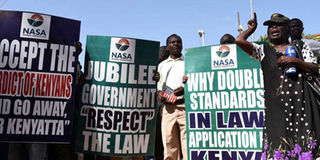Uhuru must resist temptation to take the country backwards

Opposition supporters protest outside Milimani Law Courts on February 5, 2018 against the holding of Miguna Miguna by police. This dark period witnessed unprecedented levels of repression across the country. PHOTO | EVANS HABIL | NATION MEDIA GROUP
What you need to know:
- Democracy is under threat even in countries that were once hailed as the beacons of tolerance and pluralism.
- Kenya could have risen above the fray if the Uhuruto government had not panicked and poured fuel on an already volatile situation.
The past two weeks have been a public relations disaster for President Uhuru Kenyatta.
Local and international media, not to mention social media, have been awash with bad news about Kenya.
One of the most scathing indictments came from the Washington Post, whose editorial board accused the President of “leading the country back towards the autocracy it thought it had left behind”.
The Post also blamed the President for raising tensions in the country by “shutting down the media, ignoring court orders and charging peaceful opponents with treason”.
If I were President Kenyatta, I would terminate the contracts of the expensive PR firms hired and fire all my in-house propagandists for allowing my name to be dragged in the mud.
DICTATORSHIP
But then there is only so much a PR firm or a propagandist can do.
No amount of spin doctoring can erase the events that have shocked and dismayed the world, from the illegal detention and deportation of lawyer Miguna Miguna to the withdrawal of the passports of leading Nasa figures.
People are wondering what the government will do next. Perhaps re-open the torture chambers at Nyayo House?
Is this the beginning of Kenya’s rapid slide back into dictatorship?
The Uhuruto government seems to be following the manual that Daniel arap Moi adopted after the attempted coup in 1982.
This dark period witnessed unprecedented levels of repression across the country and the mass exodus of some of our leading intellectuals.
REPRESSION
Kenyans who stayed behind or who had nowhere else to go to remember those paranoia-filled days – when Moi’s opponents were tortured or jailed and when press freedom was just a mirage – and cannot imagine that the same scenario could play out again 30 years later, and especially nearly two decades after we had our own “Arab Spring” that ushered in a new government and gave birth to a progressive new Constitution.
But then we must also remember that many revolutions are unsuccessful and are often followed by even more repressive measures.
Most of the countries in North Africa and the Arab world that had their "Arab Springs" are now worse off than they were before their citizens revolted against their governments.
Egyptians may have removed Hosni Mubarak from power, but the current military regime is no less dictatorial than he was.
In fact, intolerance seems to be its hallmark.
MEDIA
Democracy is under threat even in countries that were once hailed as the beacons of tolerance and pluralism.
In the United States, President Donald Trump has declared the media to be his Number One enemy, while in India, Prime Minister Narendra Modi is reviving a perverted Hindu nationalism that has relegated non-Hindus to second class citizens.
Ultra-right neo-Nazi movements are even making a comeback in Europe.
Nearer home, countries in the region are becoming less tolerant of dissenting voices.
From Rwanda to Tanzania, Uganda, Ethiopia, Somalia and Eritrea, there have been concerted efforts to silence journalists.
ELECTIONS
Kenya could have risen above the fray if the Uhuruto government had not panicked and poured fuel on an already volatile situation.
As the Washington Post editorial noted, if the government had ignored the “swearing-in” of Raila Odinga, it might have even discredited the Nasa campaign.
Instead it chose to go the Moi way, thereby inviting condemnation of even those who might have supported it.
However, we must remember that this government’s vindictive and ill-advised actions did not just begin on January 30.
They started during the 2013 election campaigns, when Western governments were vilified as racists and last year, when electoral officials and the Judiciary were intimidated and threatened.
MSANDO DEATH
The unsolved murder of electoral commission ICT manager Chris Msando should have served as a warning that things were going to get ugly.
However, Kenyans chose to ignore this ominous sign of things to come.
Now, we have no one but ourselves to blame for the mess we are in.
Uhuru apologists might argue that the opposition forced the government’s hand, but they cannot refute the fact that at least half of the country is unhappy with the flawed electoral body and the way the President is managing the economy.
If he wants to leave behind a legacy that he and every Kenyan will be proud of, he must resist the temptation to follow in Moi’s footsteps.
I am sure no one – not even Moi – would like to be remembered as a dictator.





